The morning of October 12, 2000, was still, hot and quiet in the Yemeni port of Aden.
Commander Kirk Lippold was looking over paperwork in his office on the USS Cole, a $1 billion guided-missile destroyer that had sailed in for a routine refuelling stop.
It was taking hours to replenish the 250,000 gallons of fuel needed to power the enormous vessel, so the crew who’d been at sea for weeks took a break for lunch.
The port call was supposed to be an uneventful pitstop on a journey through the Arabian Sea.
As local boats gently bobbed in the harbor, one suddenly veered closer without warning.
At 11.18 am, a white flash lit the water, an explosion nearly threw Lippold out of his seat, and the ship in his command erupted in flames.
The motorboat was full of suicide bombers who had detonated 1,000 pounds of explosives.
The blast tore a forty-foot hole in the ship’s steel hull. Fire ripped through the galley. Fuel and seawater poured into the lower decks.
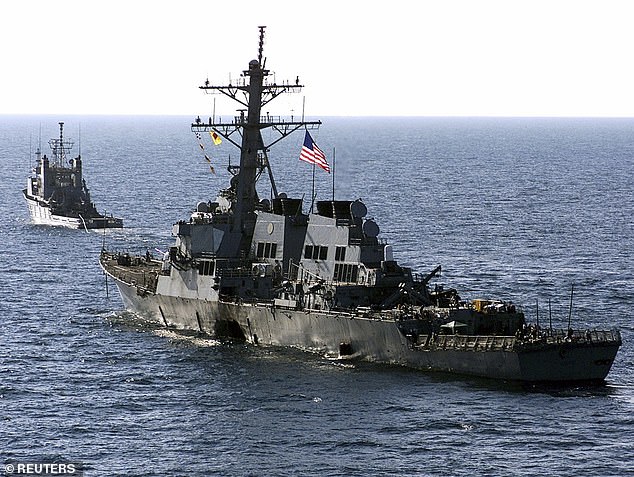
On October 12, 2000, the guided-missile destroyer the USS Cole was attacked by Al Qaeda suicide bombers
Seventeen sailors were killed instantly and forty more were wounded.
‘I knew immediately it was a terrorist attack,’ he told the Daily Mail. ‘The direction the ship was thrown told me everything I needed to know.’
He sprinted to the bridge, ordered traffic in the harbor stopped, demanded rescue boats for the wounded, and then descended into the control center — the nerve hub of the ship.
‘When I walked in,’ he said, ‘I made what I considered to be the smartest decision of my command tour. I kept my mouth shut.
‘I did that because as I stood there and I watched my crew … they were doing exactly what we needed to do to save the ship, and the last thing they needed me to do was walk in and take charge without knowledge of what was going on. I had the confidence in them … to just stand there and let them do their job.’
The Cole did not sink. Over the next 72 hours, Lippold’s sailors worked around the clock to patch holes, pump water, treat the injured and carry the casualties to shore.
An extensive investigation determined that Al Qaeda was behind the attack, a plot allegedly orchestrated by 9/11 mastermind Khalid Sheikh Mohammed.
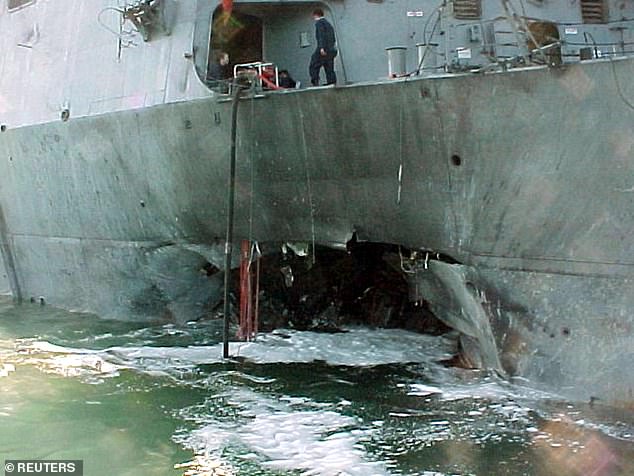
The blast tore a forty-foot hole in the ship’s steel hull. Fire ripped through the galley. Fuel and seawater poured into the lower decks
The terrorist group had already carried out attacks on the U.S. and its allies – including the 1998 bombings of U.S. embassies in Kenya and Tanzania.
Eleven months later, their threat to America and the world was fully realized with the attacks that killed 3,000 Americans.
The strike on the USS Cole was a prelude. For America, it was the start of a new kind of war that has defined the U.S. military ever since.
For Lippold, it was a moment that defined his life.
‘The true heroes that day were my crew,’ he told the Daily Mail. ‘They saved that ship. They saved each other. And they set the example for everything I’ve tried to do since.’
Nearly twenty-five years later, the retired commander has found a new battlefield: The sprawling, billion-dollar industry of charities that support veterans.
It’s a system he believes has its flaws and needs fixing.
Through an organization called Charities for Vets, Lippold is exposing what can only be described as a betrayal of America’s wounded warriors: Money vanishing between the donor and the veteran.
‘Last year alone, over 1.6 billion dollars went to organizations we [Charities for Vets] categorized as not recommended,’ he said.
‘That’s not to say the money was wasted. It just wasn’t used effectively. Too much was eaten up in fundraising, salaries, and overhead. Less than 75 percent reached the people who actually served.’
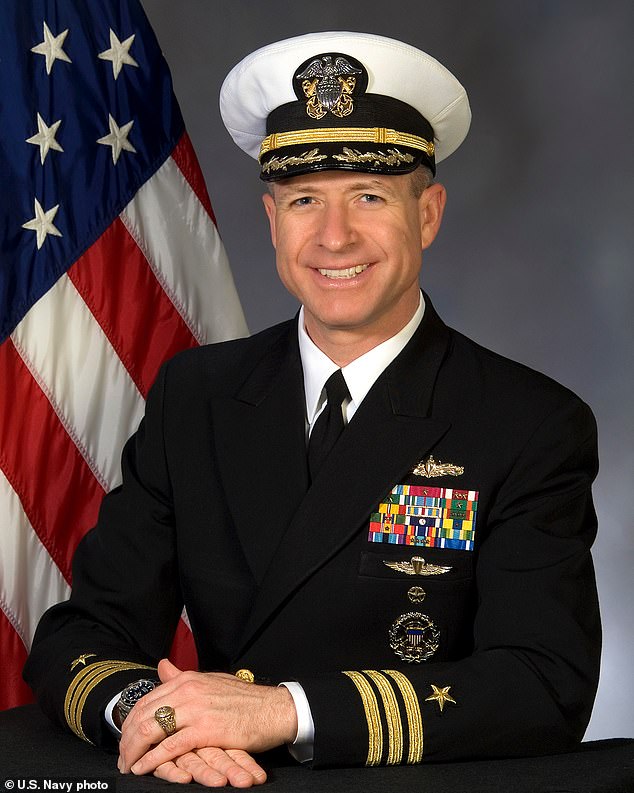
Commander Kirk Lippold was looking over paperwork in his office on the USS Cole when the blast struck. Nearly twenty-five years on he says his crew were the heroes of that day
Charities for Vets grades each organization by how much of every dollar goes directly to veterans.
‘If 90 percent or more goes to veterans, that’s highly recommended,’ he explains. ‘If it’s 75 percent or more, recommended. Less than that, not recommended. It’s black and white. There’s no wiggle room.’
He stresses he’s not out to shame and name names, but to inform and educate donors who want to support veteran organizations.
‘We’re not telling people who to give to,’ he says. ‘We’re telling them: here are the numbers. Here’s where your money really goes. Then it’s your decision.’
Lippold’s message is straightforward: ‘If people move their donations toward the efficient charities, everyone wins.
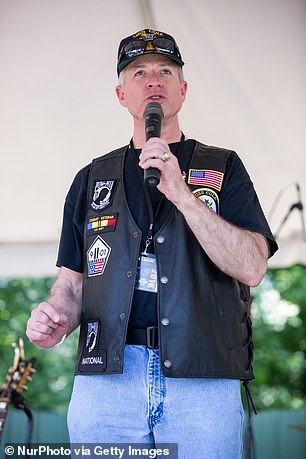
Through an organization called Charities for Vets , Lippold is money vanishing between the donor and veterans
‘Veterans get more help, charities are motivated to improve, and the public learns who’s actually doing the work.’
‘The only thing I would ask is that, especially as we come into the holiday season, people choose to give to various charities, take time to learn about which ones truly meet their mission statement, and where the most of their hard-earned dollars are going to be applied and support those veterans who give and do so much for our nation.’
Lippold rejects the modern instinct to label every combat veteran as broken.
‘People think if you’ve been to war, you must be mentally scarred for life,’ he says. ‘It’s not true. Trauma is normal. It’s your mind processing something horrific. That doesn’t make you weak.’
And he refuses to call Post-Traumatic Stress a disorder. ‘I tell medical people all the time: it’s not a disorder,’ he said.
‘It’s an issue, something you work through. My sailors had nightmares, anxiety, anger – all normal human reactions. I told them that. They went on to live full lives, raise families, start businesses. That’s resilience, not disability.’
He continues to stay in touch with his crew, maintaining a close bond that reflects his enduring leadership.
‘We’re just a very tight-knit group,’ he said. ‘We don’t stick our fingers into each other’s lives – we just stay in touch and make sure that if at any point somebody needs a little bit of help, we’re there.’
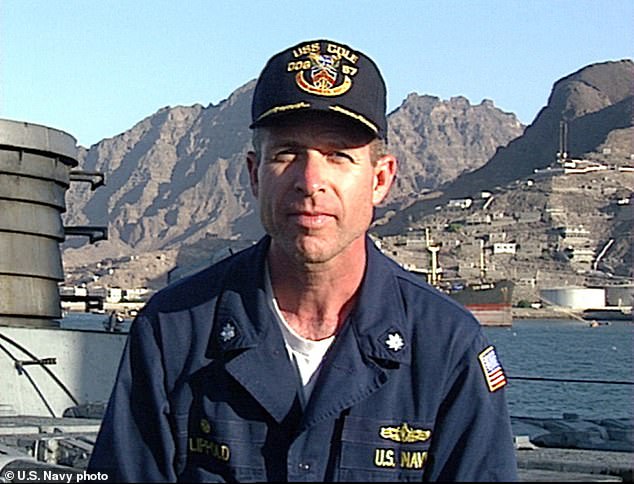
As Commander Lippold carries on his journey and campaign for Americans who served, he still reflects on the men who stood alongside him on the morning of October 12, 2000
Less than a year after the 2000 attack, in the aftermath of 9/11, the USS Cole returned to sea and has been on active duty since.
Last Christmas Eve, she returned from deployment after shooting down 17 Houthi missiles and drones in the Red Sea and defending Israel from Iranian ballistic missiles.
‘You can’t ask for better than that,’ Lippold told the Daily Mail. ‘The ship they (the crew) saved is still out there, still fighting for freedom.’
Even though his focus is on veterans, he still has one eye on the rest of the world and the dangers he believes the world – and the U.S. – is sleepwalking into.
‘The American people and the world should not be complacent to the threat that exists from terrorism and from other nations who do not comport with international law,’ he warned.
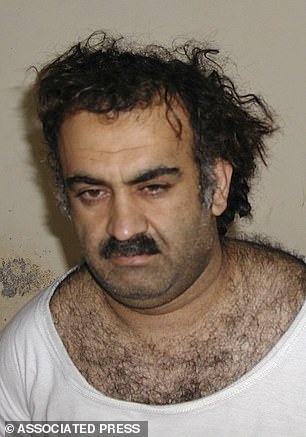
An extensive investigation determined that Al Qaeda was behind the attack, a plot allegedly orchestrated by 9/11 mastermind Khalid Sheikh Mohammed
He points to Russia’s invasion of Ukraine and China’s expansion in the South China Sea as proof that the so-called rules-based world order ‘never really existed’ because violators are rarely held accountable.
On the Middle East, he says the region has ‘fundamentally changed,’ especially after Israel’s decisive strikes on Hezbollah in the aftermath of the October 7 terrorist attacks.
‘People don’t realize that this just changed,’ he says, arguing that Israel’s willingness to act forcefully has sent an unmistakable signal to Iran and its proxies.
Turning to the threat of Al Qaeda, Lippold says the group may never return to its former power but warns they can still ‘conduct some very lethal strikes’ designed to ‘change the mindset of a population and or the government.’
Terrorism, he adds, remains ‘a very effective’ tool of psychological warfare even when casualty counts are smaller.
On China, his words are cutting. ‘China goes out and builds up militarized islands throughout the South China Sea,’ he said, ‘and what was the world’s response? Strongly worded protests and letters at the United Nations and virtually nothing done because China’s got trade.’
He points to Hong Kong as another casualty of complacency. Democracies, he argues, have allowed Beijing to erode freedom with almost no consequence.
And when it comes to dealing with terrorists, his stance is unflinching. ‘When people violate international law, I’m one of those that has a very hard-nosed policy that says, “look, you kill an American, you wound an American in an act of terrorism, we’re going to hunt you down,”’ he said.
‘If we can possibly capture you, we might try,’ he continues, ‘but we’re certainly going to aim to kill you.
‘I’m sorry, after 20 years of Hamas running the Gaza Strip, everybody knew what they were up to.
‘So you can’t be tacitly supporting terrorists and then be shocked and surprised when suddenly your kids get blown away by the bomb going after the terrorists that are living under the hospital and you’re living next door?’
As Commander Lippold carries on his journey and campaign for Americans who served, he still reflects on the men who stood alongside him on the morning of October 12, 2000.
‘I look back at that young crew and what they did that day,’ he said. ‘In the worst moment, they rose to it.
‘They saved each other. They saved the ship. And the only way I can repay that is by still serving – by standing up for veterans, by holding charities to account, by reminding America that the threat from terrorism and corruption never really goes away.
‘The attack on the Cole happened. We don’t get to pretend it didn’t. What we do get to decide is what we do with it now.’
